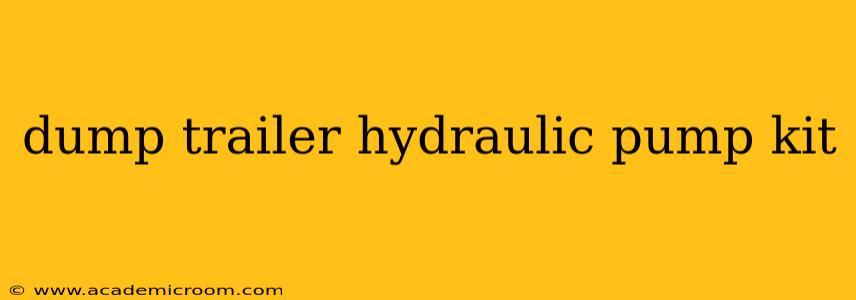Finding the right hydraulic pump kit for your dump trailer is crucial for ensuring safe and efficient operation. This comprehensive guide will walk you through everything you need to know, from understanding different pump types to troubleshooting common issues. We'll even tackle some frequently asked questions to help you make an informed decision.
What is a Dump Trailer Hydraulic Pump Kit?
A dump trailer hydraulic pump kit is a collection of components that work together to generate the hydraulic pressure needed to lift and lower the dump bed of your trailer. This kit typically includes a hydraulic pump (often powered by the truck's PTO – Power Take-Off), a reservoir for hydraulic fluid, hoses, fittings, and potentially a control valve. The pump draws fluid from the reservoir, pressurizes it, and sends it to the hydraulic cylinder responsible for raising and lowering the trailer bed. The quality and components of the kit significantly impact the performance and longevity of your dump trailer.
Types of Hydraulic Pumps for Dump Trailers
Several types of hydraulic pumps are used in dump trailer systems, each with its own advantages and disadvantages.
-
Gear Pumps: These are relatively simple, durable, and cost-effective. They offer consistent flow at lower pressures, making them suitable for many dump trailer applications.
-
Piston Pumps: Piston pumps provide higher pressure and flow rates compared to gear pumps. This makes them ideal for heavier-duty dump trailers or those requiring faster lift times. They are generally more expensive than gear pumps.
-
Vane Pumps: Vane pumps offer a compromise between gear and piston pumps, providing a balance of pressure, flow rate, and cost. They are often a good choice for medium-duty applications.
The best pump type for your needs will depend on factors such as the size and weight of your dump trailer and the frequency of use.
How to Choose the Right Dump Trailer Hydraulic Pump Kit
Selecting the appropriate kit involves considering several key factors:
-
GPM (Gallons Per Minute): This indicates the pump's flow rate, directly impacting how quickly the bed lifts and lowers. Higher GPM means faster operation but often requires a more robust pump.
-
PSI (Pounds Per Square Inch): This represents the pump's pressure output. Higher PSI is needed for heavier loads and larger dump beds. Ensure the chosen kit's PSI rating exceeds the requirements of your trailer.
-
PTO Compatibility: The pump must be compatible with your truck's PTO shaft in terms of both speed and spline count. Incorrect compatibility can lead to damage.
-
Reservoir Capacity: The reservoir's size determines how much hydraulic fluid it can hold. A larger reservoir might be beneficial for longer operation times and less frequent fluid level checks.
What are the common problems with dump trailer hydraulic systems?
Several issues can arise within a dump trailer's hydraulic system. These often stem from:
-
Low Hydraulic Fluid: Regularly check and maintain the fluid level. Low fluid can lead to pump cavitation and damage.
-
Leaking Hoses or Fittings: Inspect hoses and fittings for cracks or leaks regularly. Leaks can lead to a loss of pressure and system failure.
-
Faulty Pump: A malfunctioning pump may be noisy, produce weak lifting power, or fail to operate entirely. Replacement may be necessary.
-
Clogged Filters: Clogged filters restrict fluid flow, reducing efficiency and potentially damaging the pump. Regular filter changes are essential.
-
Worn Hydraulic Cylinder: The hydraulic cylinder, responsible for the bed's movement, can wear out over time. This often manifests as slower lifting or lowering speeds or uneven movement.
Addressing these problems promptly can prevent more significant and costly repairs.
How do I maintain my dump trailer hydraulic system?
Regular maintenance extends the life and performance of your dump trailer hydraulics:
-
Check Fluid Levels: Frequently check the hydraulic fluid level and top it off as needed, using the correct type of fluid specified by the manufacturer.
-
Inspect Hoses and Fittings: Regularly inspect hoses and fittings for wear, cracks, or leaks. Replace damaged components promptly.
-
Change Filters: Replace hydraulic filters according to the manufacturer's recommendations.
-
Lubricate Moving Parts: Lubricate any moving parts of the hydraulic system to reduce wear and ensure smooth operation.
-
Avoid Overloading: Overloading the dump trailer can put excessive strain on the hydraulic system, leading to premature failure.
Where can I find replacement parts for my dump trailer hydraulic pump kit?
Replacement parts for dump trailer hydraulic pump kits are available from various sources, including agricultural equipment suppliers, trailer parts dealers, and online retailers. Always ensure you are using genuine or high-quality replacement parts to maintain system integrity.
By carefully considering these factors and practicing regular maintenance, you can ensure your dump trailer's hydraulic system operates efficiently and safely for years to come. Remember, if you’re unsure about any aspect of repair or maintenance, it's always best to consult a qualified mechanic.
